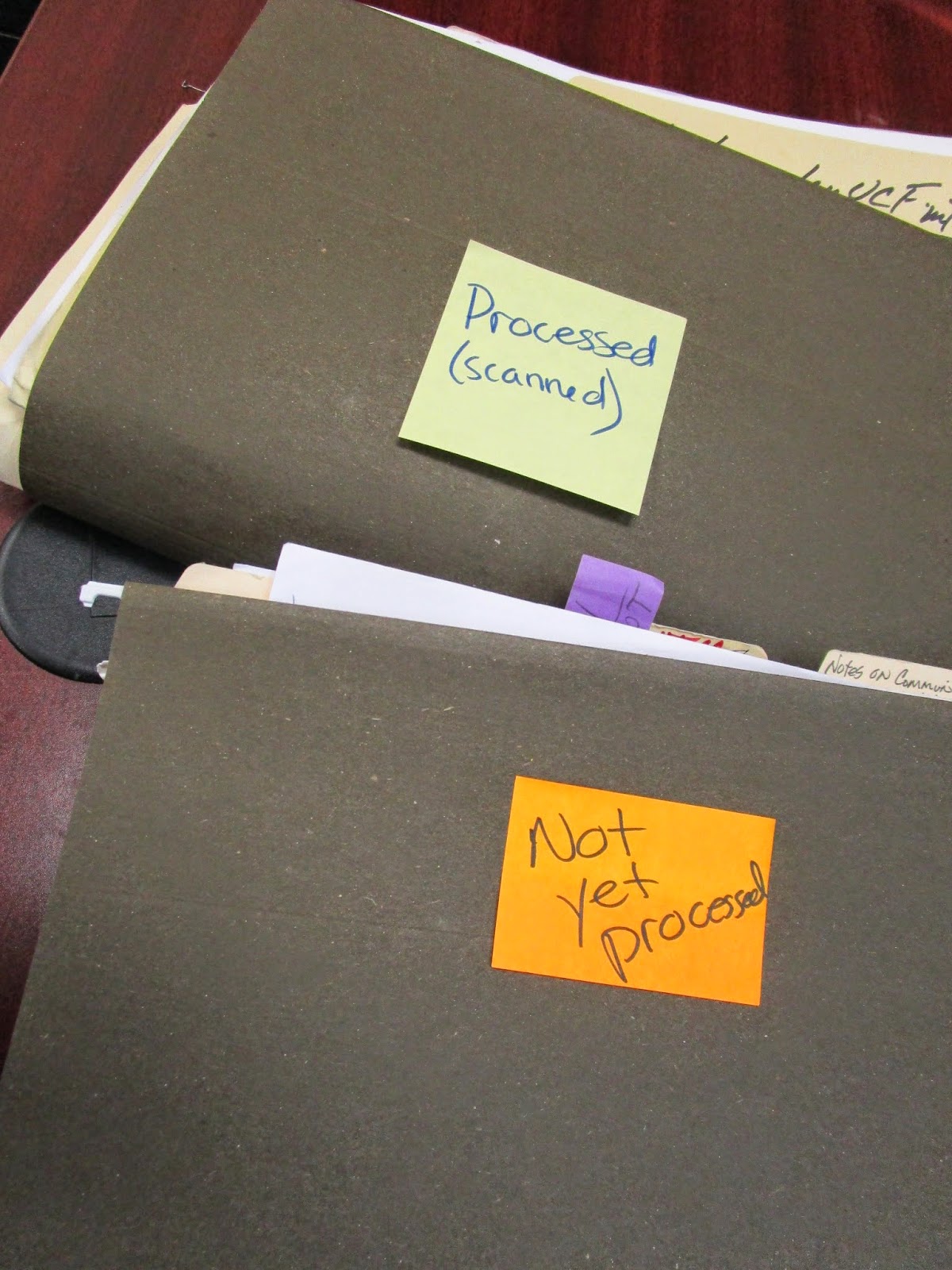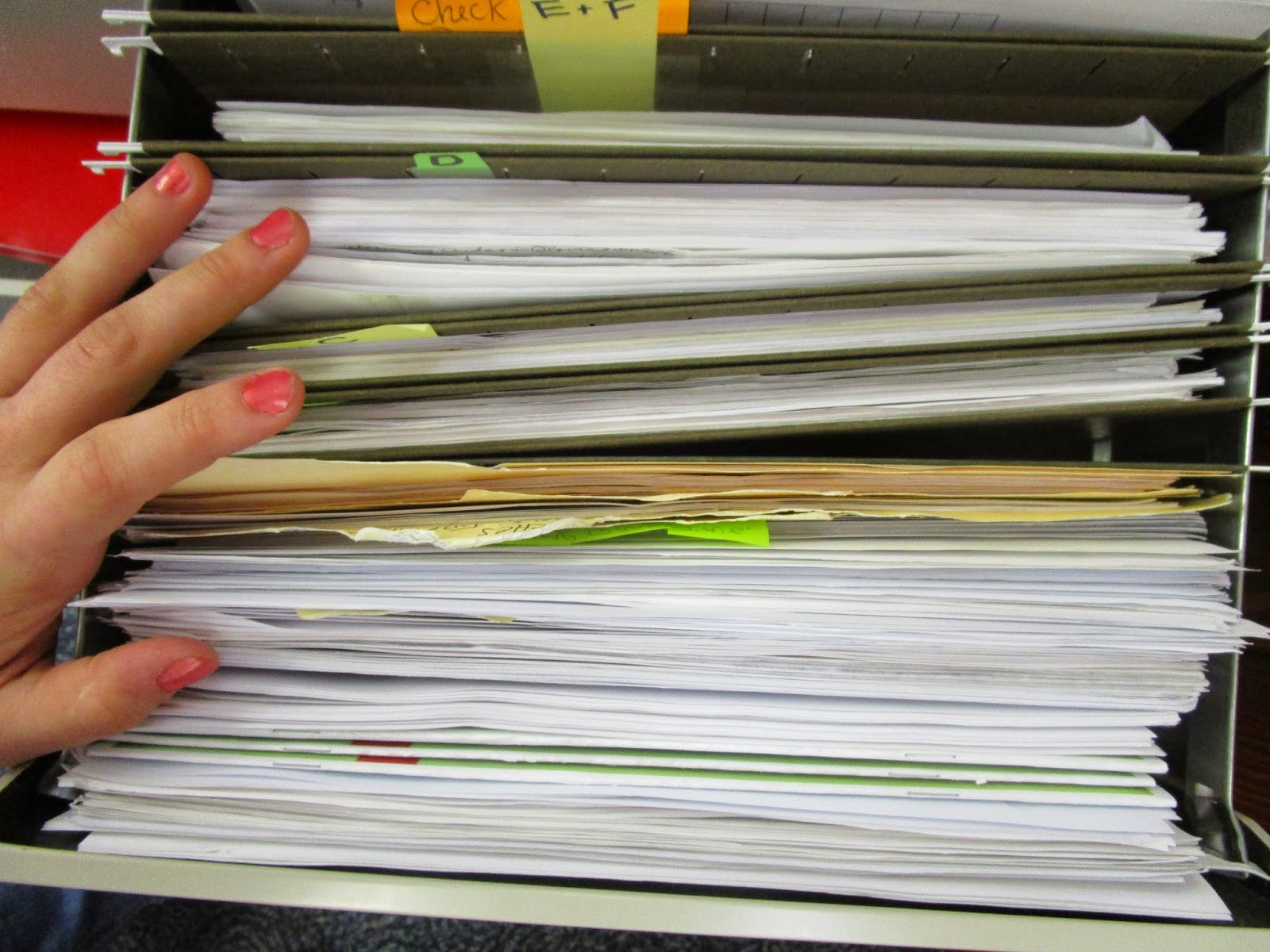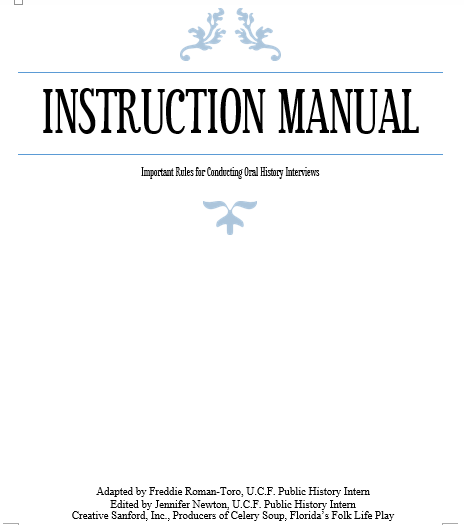This week I spent eight hours scanning and sorting the physical copies of interview and an additional four labeling and sorting the scanned files into an excel spreadsheet file.
My last post had a pretty great summary of what office life is like for me.
One thing I learned: to make sure everything is saved to more than one source. My computer crashed (literally... and screen separated from body). Fortunately I had been saving to a USB, but that reminded me to save it to a third source as well...
This coming (and final) week I intend to gather all of the hardcopies of what I've done and talk to Trish, my mentor. She will let me know whom I should talk to so that my efforts can be utilized by the playwright.
Unfortunately I did not get to interview more people about their lives in Sanford. However, depending on schedules, I might be able to do some of that this coming summer. We'll see. I don't have to volunteer just for school. ;)
This week is a particularly short blog because I am saving my "reflection over this full semester" for my last entry next week.
Celery Soup 4 Me and You
Friday, April 24, 2015
Monday, April 13, 2015
An Office Job
This week I spent a day in the office scanning paper, and
another day labeling and sorting the digital files from those scans.
Like the transcription work, I do not feel like there is any
enthralling revelation that I have from this. I am spending hours and hours
processing hundreds or thousands of pages (digitally and physically) so that
later someone else won’t have to.
Here is a glimpse of what I was doing in the office:
 1. The day started with a cup of coffee (see my lovely yellow
mug) which I brought from home (because coffee makes every morning better).
1. The day started with a cup of coffee (see my lovely yellow
mug) which I brought from home (because coffee makes every morning better).
2.Then I set up my printer/scanner. The office already had two
other fax/printer/scanners but one of them could not connect to a computer and
the other scanned each page independently. I needed my machine to scan 30 and
50 page documents as a single document, and so I brought one from home.
 3. Then I dredged the files from the cabinet. As I opened each
folder I compared them to our digital database so that I wouldn’t make
duplicates. Then I scanned the transcription and permission/release forms separately
(for ease of access later.) Then I stapled/paper clipped the interviews to
their release forms and re-filed the physical copies alphabetically.
3. Then I dredged the files from the cabinet. As I opened each
folder I compared them to our digital database so that I wouldn’t make
duplicates. Then I scanned the transcription and permission/release forms separately
(for ease of access later.) Then I stapled/paper clipped the interviews to
their release forms and re-filed the physical copies alphabetically.
4. I have several new office friends now. One is the printer
function which scans stacks of paper at a time. This process would be
infinitely longer if I had to copy each page individually. The others come as a conglomerate: paperclips, staple
remover, stapler, and sticky notes… These are the essentials of any office.
Here you can see how much I’ve done. I feel successful when I stack it all together like that.

This is why no one likes paperwork… Except that I did enjoy
the repetition of the task. I don’t want to make a career of this job, but I am
enjoying a few days in the office.
Friday, April 10, 2015
So. Much. Paper.
The last time that I walked into the optometrist for an appointment I
noticed that they still kept their files in physical copies, and I wondered,
why? It seems so inefficient. It seems like a difficult database to search
since it is stacks and filing cabinets of paper. I now know why. It takes an
incredibly long time to transfer information from hard-copy to digital database,
especially if it is not impeccably organized to begin with.
When I started my new task I thought that it would be a decent amount
of work, but I had no idea of exactly how much. I hoped that I would have time
to conduct more interviews. I
This week I started organizing and labeling documents so that I can
scan them into a digital file and then incorporate that file as a hyperlink
into an excel document so that Jules Corriere, the new playwright, can make good use of the information that
we already have.
Instead of the earlier work that I was doing (which required my
interaction with other people) this job is really lonely. To some degree that
is good. The office where I am working is secluded, so I can take off my shoes and listen to music while I sort and
file and scan and list. It is nice to create my own work environment, but I do miss
talking with people.
Friday, April 3, 2015
Change Will Come
For
those who have not seen Celery Soup’s production of Touch and Go (and you should) the title of this article is the name
of one of their songs and a theme of their productions. I chose it because this
week marks a change in my internship. I am under new supervision (My previous
mentor is enjoying her vacation in China, but she will be back in time for my
final review.), and my project focus has changed. Since I have completed by four interviews my
new task is organizing the interviews that have already been recorded or
transcribed so that the new playwright can easily access them in the future. To
that end, I spent time with Linda on Monday as she explained the current state
of the documents (a combination of physical transcriptions, digital documents,
and audio files) so that I may begin organizing them in an excel document. My
first step has been organizing and labeling the digital files (grouping files
by interviewer/interviewee). My next step will be sorting through the hard
copies so, comparing them to the digital copies (checking for duplicates, etc…)
and scanning copies to fill gaps in our digital information.
Meanwhile,
I am also finishing my fourth transcription.
Something
else Linda and I did while we met was travel around downtown Sanford so that
she could introduce me to several other people whom Celery Soup wants to
interview.
 Although it will be impossible to interview and transcribe
more interviews, I hope to at least conduct one or two more interviews for the
database. Honestly, the interview is my favorite part of this process. The
other aspects necessary and somewhat engaging, but I absolutely love talking to
the people. I love hearing the new stories. I guess that makes me an extrovert?
Although it will be impossible to interview and transcribe
more interviews, I hope to at least conduct one or two more interviews for the
database. Honestly, the interview is my favorite part of this process. The
other aspects necessary and somewhat engaging, but I absolutely love talking to
the people. I love hearing the new stories. I guess that makes me an extrovert? Thursday, March 26, 2015
The Butler
You know what’s odd about
transcription? When sit in my corner I am not attentive to anything around me:
my eyes on my screen, my mind on their words, and my headphones in my ears. For
all intents and purposes it is solitary work. Unfortunately, I am a social
person. I draw energy from people interactions and conversations. I thrive in
movement and discussion–Which is probably why I think the interview process is
so much fun. The surprising think about transcription to me is that I don’t
feel alone while I do it. Even if I am not adding to the conversation, I get to
listen to a conversation. While I type out their voices I assume almost the
same silent-listening role as when I conduct the interviews.
As I predicted last time, the
hardest part about transcribing my most recent interview (about the Butler
movie with seven participants) at first was discerning one speaker from
another. Some of the voices are very distinct, others less so. Since I anticipated this problem, during the
interview I noted which speaker discussed each topic so that, if I had trouble,
I could just reference the notes. As I get farther along in the transcription,
it gets easier to tell each of the ladies apart.
Also, many of the women from that
interview were happy to give a follow-up interview based on the topics we
discussed – which is super exciting. Therefore, while I transcribe this
interview I am also noting several topics and discussions that they showed an
interest in. Those topics can then be used as a springboard for their next
interview.
Saturday, March 21, 2015
Dinner and a Show
 My fourth interview took place this Monday night at the Sanford History center in downtown Sanford. I led the interview, once again, but it was different from all of our previous interviews because we used a movie, The Butler (2013) to help us set the tone for the questions. For those who have not seen this film, it is the about a butler at the Whitehouse who served for seven presidencies and during the civil rights movement. As we watched the movie we strategically paused and asked questions of the ladies present. Unfortunately, the male interviewees were unable to attend this viewing. The responses we received were intriguing and sometimes startling. To me, the most interesting part was their consensus on so many things although their origins and backgrounds were often very different.
My fourth interview took place this Monday night at the Sanford History center in downtown Sanford. I led the interview, once again, but it was different from all of our previous interviews because we used a movie, The Butler (2013) to help us set the tone for the questions. For those who have not seen this film, it is the about a butler at the Whitehouse who served for seven presidencies and during the civil rights movement. As we watched the movie we strategically paused and asked questions of the ladies present. Unfortunately, the male interviewees were unable to attend this viewing. The responses we received were intriguing and sometimes startling. To me, the most interesting part was their consensus on so many things although their origins and backgrounds were often very different. For those who have not seen the film, here is a link to the trailer.
https://www.youtube.com/watch?v=DUA7rr0bOcc
Because it began around dinnertime we served sandwiches and fruit and drinks so that everyone felt comfortable. The questions I asked were prepared beforehand, although I occasionally pursued side trails based upon their answers. I focused on the topics of family and race relations and sought the themes of community, helping one another, and relationship. Here are a few examples of my questions.
1. Louis couldn’t understand why his father would serve as a butler. In fact, he was ashamed of his father’s position. When Louis went off to college, he became involved in the Civil Rights Movement. Cecil strongly disagreed with Louis’ choice. He was ashamed of his son’s decision. Cecil was so upset, he didn’t speak to his Louis for years. And the central image of fortitude that stands between them is Gloria who holds the family together. How did the age difference between you and your parents cause you to have different perspectives on things?
2. In your family, did you discuss desegregation? How did you feel about the issue? Did your family agree with you? What divisions did it cause among you? How did your friends discuss desegregation? How has your parents’ view of racism changed who you are?
3. In an interview Oprah stated that “Gloria is every woman. She represents every mother, wife, sister, friend and daughter who grew up when women were the silent backbone for everything and everybody. Women who sacrificed their dreams and desires for the greater good of family and children.” - Oprah Winfrey Describe the backbone of your family growing up. Who held everyone together?
All of the interviewees seemed keen to continue this discussion. The length of the actually interview was limited due to the length of the movie, but it stirred up thoughts which will be wonderful to readdress in a follow-up interview.
Another way this sort of interview could be conducted (for time’s sake) is by showing short 5-10 minute clips (perhaps from YouTube) to engage emotions and inspire interesting conversation.
Friday, March 13, 2015
One Down, One to Go
I am so excited because I finally
finished editing the instruction manual for Celery Soup! It took a lot more
time and effort than I thought it would–organizing all of that information and
formatting it neatly and correcting errors–and a lot of the information was
already vaguely assembled by a previous intern. I have a new respect for the
time it takes to organize people and information in a professional way.
 My next
interview will be on Monday, March 16th based on the movie The Butler. This interview will be
particularly interesting because it will incorporate a lot more interviewees (at
least seven people will be attending) who are unrelated. This means there will be new challenges. It may
be difficult to maintain control over the conversation when we discuss a topic which
interests several of the interviewees at a time. It will be difficult to keep
the interviewees from overlapping. It may be more intimidating to question a
group. Since there will be more challenges, there will be several things I must
keep in mind (and since I just finished my instruction manual to help the next
intern along, I know what I must be careful for). It will be important to ask
questions directly to a person and not vaguely at a group. I should use the
names of the interviewees I am talking to for ease of transcription later. Perhaps
the most difficult thing to remember will be to keep track of time.
My next
interview will be on Monday, March 16th based on the movie The Butler. This interview will be
particularly interesting because it will incorporate a lot more interviewees (at
least seven people will be attending) who are unrelated. This means there will be new challenges. It may
be difficult to maintain control over the conversation when we discuss a topic which
interests several of the interviewees at a time. It will be difficult to keep
the interviewees from overlapping. It may be more intimidating to question a
group. Since there will be more challenges, there will be several things I must
keep in mind (and since I just finished my instruction manual to help the next
intern along, I know what I must be careful for). It will be important to ask
questions directly to a person and not vaguely at a group. I should use the
names of the interviewees I am talking to for ease of transcription later. Perhaps
the most difficult thing to remember will be to keep track of time.
Subscribe to:
Comments (Atom)





